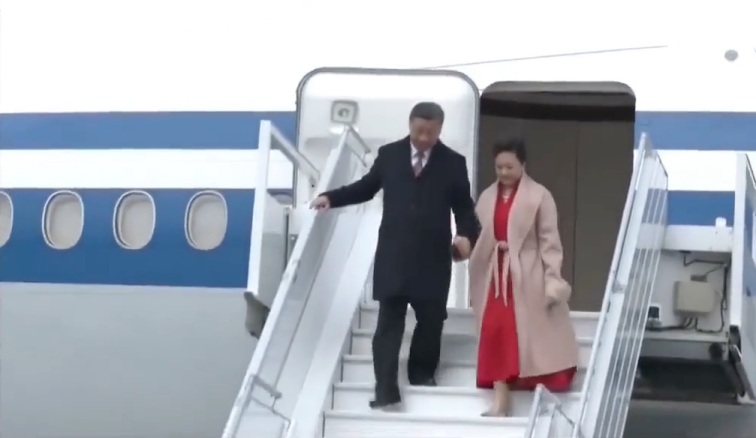Xi Jinping's greatest concern is protecting his family. (People News)
[People News] The Chosun Ilbo recently cited a report from The Washington Times, revealing that a U.S. Congressional Research Service (CRS) document discloses hidden assets worth over $700 million held by Chinese Communist Party (CCP) General Secretary Xi Jinping and his family, both domestically and abroad. This report not only highlights the wealth distribution among the CCP elite but also serves as a targeted strike—or political warning—against Xi Jinping’s regime amid the current U.S.-China strategic rivalry.
According to the report, these enormous assets are primarily registered under the names of Xi’s older sister Qi Qiaoqiao, brother-in-law Deng Jiagui, daughter Xi Mingze, and cousin Qi Ming. The holdings include an 18% stake in a rare earth company, investments in Beijing tech firms, and early shares in Wanda Group yielding massive returns. If true, these revelations would seriously undermine Xi’s carefully cultivated image as an “anti-corruption crusader.”
But more telling than the wealth itself is the institutional anxiety and the deep crisis of personal rule that this “capital flight” reflects.
1. The Authoritarian Path Under a “Philosophy of Struggle”
Mao Zedong appointed several successors—Lin Biao, Hua Guofeng, Deng Xiaoping—only to later purge or sideline them. This wasn’t due to mere personal distrust but stemmed from a core tenet of CCP political culture: the “philosophy of struggle.” This system relies on constant “self-revolution” and the periodic purging of old leadership teams to maintain the regime’s legitimacy.
Xi Jinping has clearly inherited this tradition. Through his anti-corruption campaigns, military purges, and the restructuring of the Central Military Commission and Rocket Force, he has continually removed potential threats under the banner of reform. In such a political structure, choosing a successor becomes an extremely risky move: once someone is seen as the “heir apparent,” their political aura can itself pose a threat to the dictator.
2. “No Successor” Is a Structural Destiny
American scholar Cheng Li once observed: Mao Zedong had successors but wouldn’t allow them to succeed,” whereas Xi Jinping “cannot select a successor and must remain in power.” Yet the essence is the same—within a system that rejects power-sharing and institutional oversight, a dictator is forced to walk the path alone.
Xi’s family has long been detached from Chinese politics. His younger brother Xi Yuanping has moved to Australia; cousin Qi Ming is under investigation for money laundering; and his sisters have long since emigrated. Whether by choice or design, they have stayed away from political life, making it impossible to replicate a “dynastic handover” like that of the Castro brothers in Cuba.
If a generational transfer were to be attempted, Xi Mingze would require years of grooming, even with full support. This may be yet another reason Xi intends to “rule until death.”
3. Can a Dictator Exit Peacefully?
From Lenin and Stalin in the Soviet Union, to Kim Il-sung and Kim Jong-il in North Korea, and Enver Hoxha in Albania, most communist dictators have ruled until death. Their refusal to hand over power is not merely personal—it is a structural reality. Naming a successor means diluting one’s own authority; making space for others means inviting one’s own downfall.
A rare exception is Fidel Castro, who passed power to his brother Raúl and retired under relatively secure conditions. But Cuba is a unique case, where external pressures peaked and internal consensus was relatively stable.
Can Xi Jinping achieve a peaceful transition? That depends not only on his health and willpower, but also on whether he’s willing to break the cycle of “life-long rule—political purges—paranoia over power.”
4. The Facade of “Victory” and Diplomatic Isolation
In official CCP narratives, Xi’s phone calls with Donald Trump, Premier Li Qiang’s visit to ASEAN, and PLA delegations attending the Shangri-La Dialogue are all framed as signs of “diplomatic victories” and “strategic confidence.” But the reality is more troubling: tensions in the South China Sea are escalating, the Taiwan issue remains in a deadlock, and global public opinion toward China continues to deteriorate.
The U.S. intelligence community’s investigation into Xi’s personal wealth and the legitimacy of his regime is no longer limited to anti-CCP rhetoric—it is becoming institutionalised and codified into legislation. This signals a fundamental shift: the U.S. is moving toward “comprehensive confrontation” with the CCP, and China is sinking into diplomatic isolation.
5. Dictatorship Is Not a Choice—It’s a Prison of the System
Xi Jinping may not have actively chosen dictatorship. Like Mao Zedong, he is being propelled forward by the system itself. The real question is: when a single person walks too far ahead and leaves no one behind to carry the torch, how does the system end? Who will clean up the mess left by the “philosophy of struggle”?
Even Xi Jinping himself may not have an answer.
He may also be confused. As a product of the CCP system, Xi has followed the principles of Marxism-Leninism, only to find himself in this position: internationally isolated, and domestically facing opposition from all sectors of society.
At its core, communism was founded on violence and struggle, values that run counter to human nature and have caused numerous societal problems. Only by abandoning these extreme ideologies and returning to more traditional and inclusive values—by dismantling the CCP and rejecting dictatorship—can China achieve stable and peaceful governance.
(Originally published by People News)







News magazine bootstrap themes!
I like this themes, fast loading and look profesional
Thank you Carlos!
You're welcome!
Please support me with give positive rating!
Yes Sure!